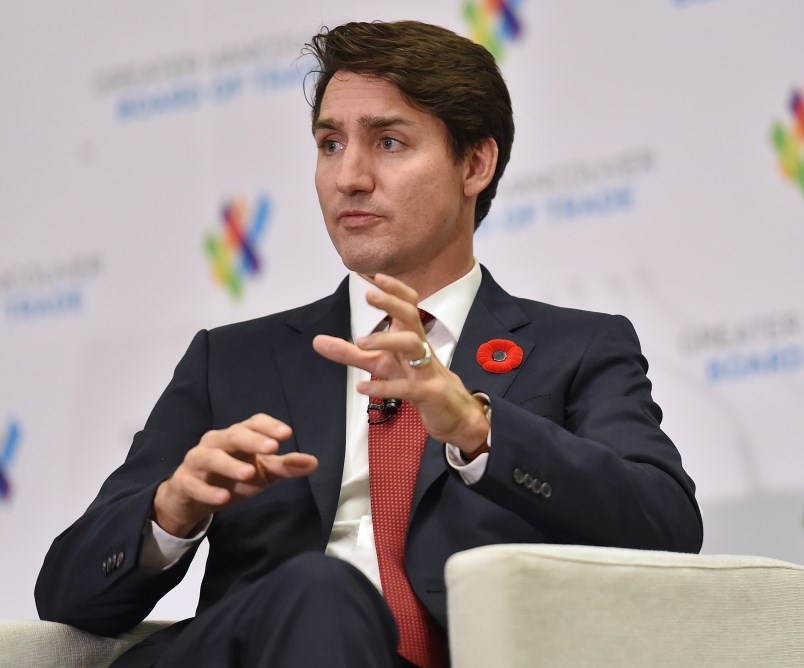Prime Minister Justin Trudeau spoke to members of Vancouver’s business community Thursday afternoon and his message was clear — Canada is looking to trade.
“Through trade we can create new opportunities for people to build real, lasting success for themselves and for their families,” he said in a speech to members of the Greater Vancouver Board of Trade. “Canada is in a very good position to make that happen.”
Trudeau referenced the government’s recently reached agreements on NAFTA, now known as the United States-Mexico-Canada Agreement, the Trans-Pacific Partnership, which goes into effect at the end of the year and links Canada to 10 other nations, including Australia, Japan and New Zealand, and the Comprehensive Economic and Trade Agreement with the European Union, which was signed in .
“We now have preferred market access to two-thirds of the global economy,” Trudeau said. “We’re the only G7 country with preferential access to European, Asia Pacific and North American markets. Simply put, we’re the only G7 country with a free-trade deal with every other G7 country.”
Trudeau referenced a visit to the Board of Trade back in 2014 after he was first elected Liberal Party leader.
“I remember saying that trade is our way forward… four years later I’m more convinced than ever that expanding access to new markets with modern, progressive trade agreements is the ticket to our success.”
He added that international trade diversification is a top priority for the Liberal government and talked about an upcoming trip to Singapore and Papua New Guinea to talk trade.
“This trip to Asia is part of our plan to keep building prosperity for people in B.C.,” he said. “Vancouver isn’t just the gateway to the Pacific, it’s the Asia-Canada hub for trade and business.”
After his speech, Trudeau sat down for a Q&A with Iain Black, board of trade president and CEO, who questioned the prime minister on a number of subjects, including the challenges of trading between provinces within Canada.
“You now have stats being released that says the barriers between the provinces doing business amongst themselves, as crazy as it sounds, is the equivalent of a 6.9 almost seven per cent tariff, almost another PST in the case of British Columbia,” Black said.
Trudeau acknowledged that it is an issue for provinces.
“This is a massive priority for us and it’s something that I’m actually pulling together a first minister meeting in December on so that we can actually really do something meaningful about interprovincial trade barriers,” he said, adding that the problem really became obvious to him when Canada signed the agreement with the European Union.
“People suddenly discovered that European countries had better procurement access to certain provinces than the neighbouring provinces did.”
Black also asked what’s next for the Trans Mountain pipeline, something Vancouver mayor-elect Kennedy Stewart vocally opposed during his time as MP for Burnaby-South. He was arrested earlier this year for defying a court order during protests over Kinder Morgan’s proposed pipeline.
“I will admit that the federal court of appeal decision was really frustrating,” Trudeau said, referencing the Aug. 30 federal court decision against Kinder Morgan’s planned pipeline expansion.
He added that the court decision gives the government a blueprint for going forward with consultation with Indigenous groups and environmental oversight.
“What the court is actually doing is laying out with more clarity the path to get big projects approved,” he said. “It means being thoughtful in your partnership with Indigenous peoples and it means getting the environmental science right… This is about creating that greater degree of clarity for businesses but also about restoring people’s trust in government and businesses’ ability to get things done right for the long term.”
It was a busy day for the prime minister. After making announcements in Manitoba Thursday morning, he stopped at the University of B.C. earlier in the afternoon to announce funding to build a nuclear medicine hub in Vancouver.
After the board of trade event, Trudeau had closed door meetings with Stewart and Surrey’s incoming mayor Doug McCallum.



